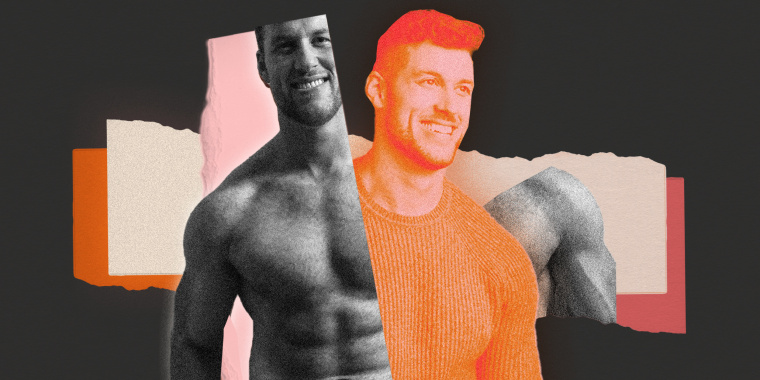Former “Bachelor” (and “Bachelorette”) star Clayton Echard is using his post-show platform to “open up” about more than the state of his heart. Still recovering from a two-season run on a television franchise that fetishizes extreme thinness and chiseled abs, Echard is now using the Bachelor media ecosystem to do the opposite.
The 29-year-old former football player has been candid about his struggles with mental health ever since appearing on season 18 of “The Bachelorette” and subsequently becoming the 26th bachelor. In an interview published by People magazine this week, Echard spoke more about his experiences with body dysmorphic disorder (BDD) — including how being on camera exacerbated his body image issues — and also provided a way to raise awareness of their harm. The interview was another revealing look at the underrepresented world of male anxiety and body image challenges. It also called out one of the franchise’s longest-running problems.
As Echard reiterated in his most recent interview, he stayed silent about these anxieties for years because he “was told that men don't care about their bodies. That's a female issue.”
BDD is a body-image disorder that the Anxiety & Depression Association of America describes as “characterized by persistent and intrusive preoccupations with an imagined or slight defect in one's appearance.” As Echard reiterated in his most recent interview, he stayed silent about these anxieties for years because he “was told that men don't care about their bodies. That's a female issue.” It wasn’t until college that he learned about BDD, providing him with the language to name his experience, and ultimately get help. (According to the National Eating Disorders Association, nearly 1 in 3 men are affected by a mental health disorder like BDD, but due to gender-based stigma, remain far less likely than women to seek treatment.)
"I felt like on ‘The Bachelorette’ side of things when I was on the show with all the other men, these guys were entrepreneurs, very successful individuals, good-looking guys, incredibly fit bodies,” Echard said “It was tough for me to be amongst them because I found myself — It felt like I had basically taken Instagram and put it in a room."
This was Echard saying the quiet part out loud. Despite the fact that he, a tall, white, square-jawed, former football player, fits the narrow vision of desirability that “The Bachelor" franchise has long promoted, Echard’s disclosure points to something fans of the franchise have long noticed: “The Bachelor” has a body diversity problem.
In its 20-year run, “The Bachelor” franchise has featured only two contestants who self-identify as plus-size, both of whom were swiftly sent home on night one and received less than a minute of screen time. This problematic absence of diverse bodies on screen is made worse by the ample time devoted to stories of weight loss from now-thin contestants, including from new Bachelor Zach Shallcross. On a recent episode of the summer spin-off “Bachelor In Paradise,” a blond man named Jacob with nary an ounce of body fat in sight spent an extended direct-to-camera interview critiquing the soft skin on one lower section of his torso.
Reality TV has the power to both reflect the culture as it exists, and to reify it. Its reactive nature is part of why fans have found pushing for change on shows like “The Bachelor” to be an effective route to changing the larger cultural dialogue — about sexism, about racism and about body diversity.
“The show equates self-worth to thinness,” says Jenna Vesper, one of the organizers behind Roses for Every Body, a campaign for fat inclusion on “The Bachelor.” “[This] sends a message that people can only find love in smaller bodies and that life only begins after losing weight. That is simply untrue.”
Roses for Every Body’s diverse group of organizers, who also self-identify as fans of “The Bachelor” franchise (Vesper co-hosts the “Date Card” podcast), want to challenge the show “to have its long-awaited reckoning with body image, and add some authentic body diversity.” To that end, they have outlined a set of concrete demands, which touch on casting, staffing, editing and mental health practices.
Like Vesper, many of reality TV’s biggest critics are also fans. We understand its power — for better and for worse. If it can be used to reinforce the thin ideal, perhaps it’s also the perfect place to challenge that ideal; to provide space for all bodies, and prove that all bodies are worthy of being seen, loved and desired.
Echard is one more example of this more hopeful perspective. Could a straight-size former lead of the show help to push the franchise as a whole forward by speaking out?
“It’s clear that he is aware of the power of his platform and the good he can do by increasing visibility around these topics,” Vesper said. “We send him well wishes and our DMs are open if he wants to connect about the cross-section of body dysmorphia, anti-fatness and the steps toward body neutrality.”

